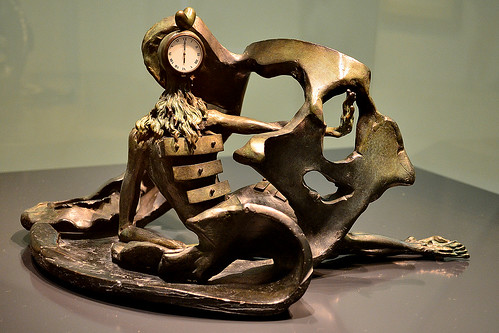Posts Tagged ‘Surrealist’
5 Great Surrealist Paintings

The Surrealist movement believed in trying to express in their art the contents of the mind when conscious control was vanished, such as in dreams or accidental wordplay. Though often difficult to understand, many of these images have nonetheless become popular and iconic pieces of art.
Perhaps the most famous is in the “Treachery of Images” series of paintings by Rene Magritte. The painting is of a pipe on a plain beige background, captioned famously with “Ceci n’est pas une pipe” or “This is not a pipe”.Many people are puzzled by this statement, until they realize the trick: the painting is not a pipe, but an image of a pipe. Magritte loved puns and verbal games such as these, and often said he wanted his audience to take a second look at their surroundings and reexamine their assumptions about reality.
Another famous surrealist artist is Salvador Dali, who painted “Dream Caused by the Flight of a Bee around a Pomegranate a Second before Awakening”. Though this is not his most famous work, it is the most representative of the Surrealist practice of imbuing every detail of their painting with mysterious but highly meaningful personal references. In this case, Dali tries to make a visual version of Freudian dream interpretation; many art scholars agree that the yellow and black tigers are representative of a bee, the bayonet refers to sudden awakening, and the pomegranates represent female sexuality. These bizarre images are set in the distinctive pale blue sky and water well-known to any fan of Dali.
Though Giorgio de Chirico predated the Surrealist movement, he is often grouped with them in the popular imagination and was a great influence on many Surrealist painters. His “Melancolie Hermetique” is an example of the sparse, unadorned style which many in the movement adopted, as well as the strange spatial dislocation of objects such as the floating head and the unexplained boxes and pillars.
MarkChagall’s “I and the Village” was heavily influenced by the images of his childhood in a Hasidic Jewish village in Eastern Europe. The whimsical images are thought of as Surrealist for their magical, dreamlike quality; most notably, a cow and a green man stare at each other inexplicably in the forefront of the painting. Chagall explained to museum historians that the focus on the man and cow together in the forefront represents nostalgia for the lifestyle he was raised in, where animals and humans were mutually dependent on each other. Moreover, animals are considered humanity’s link to the universe in his religious beliefs, and the circles in the background are symbolic of the sun, moon, and earth.
The Spanish painter Joan Miro is often considered a Surrealist as well, but his techniques and results were far different. He used the process of automatic drawing, allowing his hand to move randomly, and the resulting spontaneous shapes were incorporated into much of his work. “Bleu II” one of three paintings in a series Miro completed after a visit to America where he met with American abstract expressionist painters, is an example of the sense of purity and artistic freedom one feels in his work.
You can read about surrealist painting and more at The Modern Arts Prints.
Visit : Free Online Advertising aframeshop